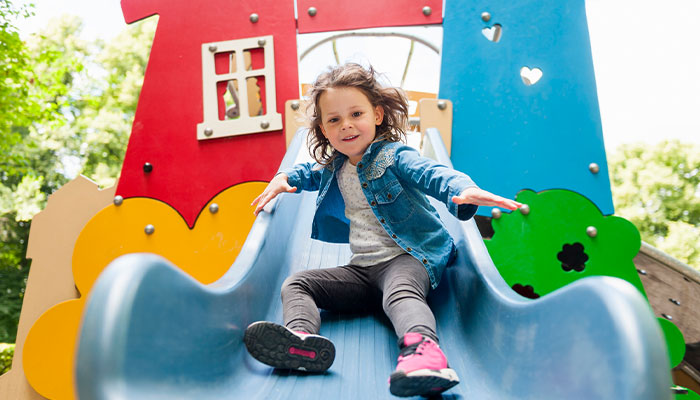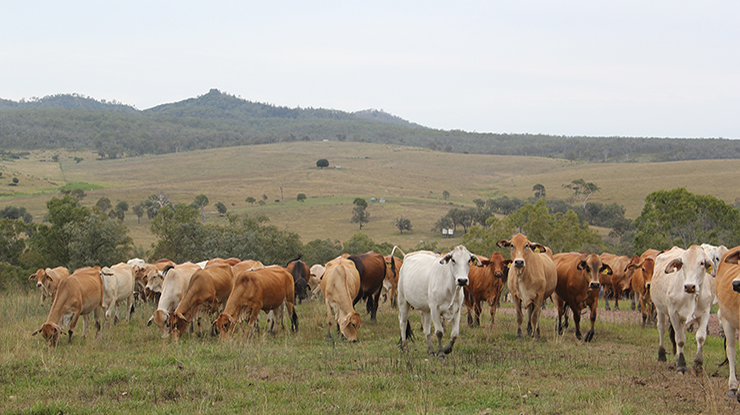Between birth and the age of five, children undergo rapid development – physically, cognitively, socially, emotionally and in terms of their ability to communicate.

Best chances: Every Australian parent and carer should make themselves aware of milestones for pre-schoolers, says paediatrician Dr Penny Uther..
MQ Health Paediatrician Dr Penny Uther says up to 90 per cent of a child’s development occurs in those vital first 2000 days.
“This is when your child is being set up for the rest of their life, and if something goes awry, it can have a huge impact on their physical and emotional health,” she says.
“A baby is born unable to control their head or use their arms, but within about 12 months, they have learned to roll over, to sit up, to walk, and say their first words.”
You can make simple obstacle courses with cushions and place interesting toys out of reach to make them move.
Uther says every parent and carer should make themselves aware of the Australian guidelines and milestones for pre-schoolers, and know whether their child is meeting them.
While a single missed milestone is not necessarily a cause for serious concern, it does provide the opportunity for early intervention, allowing a team of clinicians from different paediatric disciplines to work together if necessary.
There may be other indications of developmental issues in addition to missed milestones, such as if a child appears off balance and has frequent falls, or if their hand and arm use (before the age of two) or limb growth appears asymmetrical.
The Blue Book personal health record issued to the parents of every child born in NSW is a great source of information, while the Early Childhood Nurses (ECN) available to all new parents, GPs, and childcare and early education centres can all provide tailored advice.
Keep kids moving – and away from screens
Physiotherapist Jan Hancock says Australian guidelines describe the amount of physical activity children under five need at different ages to foster the development of their musculoskeletal system, coordination, balance and motor skills.

Watch me go: It’s important to encourage regular play-based physical activity, says physiotherapist Jan Hancock.
“Babies who aren’t yet crawling should be placed in different positions when they’re awake and alert. This could include laying them on their backs on an activity mat, or the very important ‘tummy time’. As they get better head control, they can be supported to sit in several different ways.
“Once they’re crawling, you can make simple obstacle courses with cushions and place interesting toys out of reach to make them move.”
Physical activity for pre-schoolers should be play-based, she says. While they are likely to enjoy skills training, like swimming or dancing lessons, there is no need for organised or competitive sport.
The important thing is to encourage regular physical activity and make it fun and a part of their everyday routine.
This might include chasing games, using playground equipment, riding a bike or kicking a ball in the backyard, treasure hunts or beachcombing.
Hancock says some parents and carers may not be aware of the importance of following the recommendations around sedentary and screen time in the physical activity guidelines for under-fives.
“Children younger than two should not be having any screen time at all, and for two-to-fives, it should be no more than an hour a day,” she says.
“It has been shown that too much screen time can affect children’s sleep, and that sedentary screen time during early childhood can have long-term impacts on development.”
Why reading together is important
Senior Speech Pathologist Sarah Legge says it’s never too early to start reading to babies, as this is vital in the development of their communication and literacy skills.

To the letter: Reading books also feeds under-5s’ emotional and social development, says speech pathologist Sarah Legge.
“Literacy development has far-reaching consequences once they start school,” she says. “What happens in that zero-to-five-years age range predicts what will happen later in life.
“It’s not even important to read the words on the page: talk about the pictures in whatever language you’re most comfortable in, let them touch the book and understand how the pages turn, and that it has a set beginning and end.
“It’s about sitting together for five minutes, as it also feeds their emotional and social development.”
The key is in keeping the child engaged, so if your two-year-old loves diggers, read books about diggers.
The three Rs of early reading – rhythm, rhyming and repetition – all play a part in early literacy development, contributing to learning and memory.
“As tedious as it might be for parents to read the same book over and over, it’s so important,” Legge says.
“Try mixing things up – one day you might count objects and another you could list what you see in the pictures.
“There’s no gold standard list of books to read by a certain age, either. The key is in keeping the child engaged, so if your two-year-old loves diggers, read books about diggers.”
But while there are lots of great interactive e-books for children, she says nothing can beat the all‑round benefits of a physical book in those early years.
Local libraries are a wonderful resource for parents, not only for borrowing books and attending storytelling sessions but for advice and information on reading.
Uther, Hancock and Legge will be joined by their colleague, Psychologist Dr Carolyn Schniering, for the latest MQ Health Wellness Series webinar on Thursday, 9 June from 12-1pm.
Join them to learn more about guidelines, milestones and how to help your pre-schooler reach their full potential.
Register here for FREE to watch live or receive a link to the recording to watch later.
Jan Hancock is Lead Physiotherapist at the MQ Health Paediatric Physiotherapy Clinic
Sarah Legge is a Senior Speech Pathologist at the MQ Health Speech and Hearing Clinic and a Clinical Educator at Macquarie University’s Department of Health Sciences
Dr Carolyn Schniering is Director of the MQ Health Psychology Clinic and a Senior Lecturer at Macquarie University’s School of Psychological Sciences
Dr Penny Uther is the Paediatrics Discipline Lead at MQ Health








